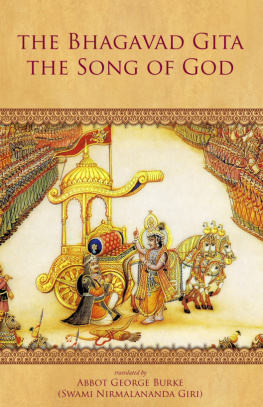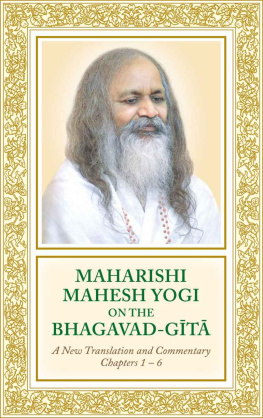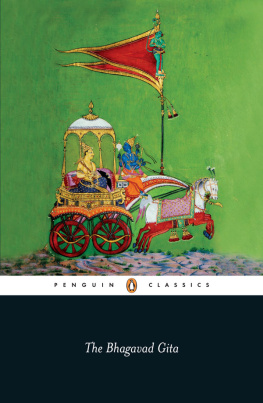The Bhagavad Gita
The Song of God
Translated by
Abbot George Burke
(Swami Nirmalananda Giri)
Light of the Spirit Press
Cedar Crest, New Mexico
Published by
Light of the Spirit Press
lightofthespiritpress.com
Light of the Spirit Monastery
P. O. Box 1370
Cedar Crest, New Mexico 87008
www.OCOY.org
Copyright 2017 Light of the SpiritMonastery.
All rights reserved.
Credits: The cover contains a detail of apainting of Krisha and Arjuna on the Battlefield of Kurukshetra bythe Rajasthani artist Bhanwar lal Girdhari lal Sharma

Contents

BhagavadGitaThe Book of Life
Several thousand years ago in north-centralIndia, two people sat in a chariot in the midpoint of a greatbattlefield. One of them, the yogi Arjuna, knew that it would benot be long before the conflict would begin. So he asked Krishna,the Master of Yoga, what should be his attitude and perspective inthis moment. And above all: What should he do?
There was no time to spare in empty words. Ina brief discourse, later turned into seven hundred Sanskrit versesby the sage Vyasa, Krishna outlined to Arjuna the way to live anentire life so as to gain perfect self-knowledge andself-mastery.
The battle was ferocious and everyone lost.Only a handful remained alive. But when Vyasa wrote his epic poem,the Mahabharata, he put Krishnas inspired words into it as aprecious jewel. Instantly they were extracted, named The Song ofGod (Bhagavad Gita), and circulated throughout thesubcontinent.
That was several thousand years ago, and todaythe Gita is found in households throughout India and has beentranslated into every major language of the world. Literallybillions of copies have been handwritten and printed. (A few yearsago a spiritual organization in South Africa printed one millioncopies for free distribution!)
What is the appeal of the Gita? First of all,it is totally practical, free of any vague or abstract philosophy.During my first trip to India over fifty years ago, I heard about ayogi who lived in a small houseboat on the Ganges river in the holycity of Benares (Varanasi). He never spoke or wrote; yet every dayfor many years people came to him for advice. How did he manage? Hehad a copy of the Bhagavad Gita, and after he was told the problemor question he would open the book and point to a portion. And theinquirer would have a perfect and complete solution to thetrouble.
My own spiritual awakening began by kicking meout of the nest of comfortable religion into a vast world ofrealities I had no idea how to cope with. I floundered around inthe sea of my new horizons until one day I bought a copy of SwamiPrabhavanandas translation of the Bhagavad Gita (which is still myfavorite translation). I did not read it, I inhaled it. I was notreading the words of a long-dead teacher: my own Self was talkingto me in the pages of that little book. Nor did I learn anythingfrom the GitaI remembered that which I had always known. EternalSelf spoke Eternal Truth. The Bhagavad Gita changed my life bygiving me Life. Life that has never ended.
Nothing has ever arisen in my life, internalor external, that the Gita has not made clear and enabled me todeal with or understand. Yet is it not dogmatic. At the very endKrishna says to Arjuna: Now I have taught you that wisdom which isthe secret of secrets. Ponder it carefully. Then act as you thinkbest. No threats, no promises, no coercion. It is all in thereaders hands. Even better: the Bhagavad Gita tells us that we canattain a Knowing beyond even what it tells us. And it shows us theway.
Some years ago I arranged the text of the Gitaaccording to the meter of the original Sanskrit so it could be sungas part of the daily routine of our ashram, as is usual in many ofthe ashrams of India. It was also recorded, and those who heard therecording commented that they were surprised at the accuracy of thetranslation. So it occurred to me that if I went through and tookout the meter, adding anything that had been omitted to keep themeter and making logical adjustments to clarify the meaningfurther, it might be of value to others. As it turned out, I madechanges and adjustments to virtually every verse. And here it is. Ihope you will use the glossary to assist in your understanding ofwhat you read, because some Sanskrit words must be included in thetext because they have no English equivalents, and to use wordswith only approximate meanings will obscure the meaning of thetext.
The background of theGita
The present text of Mahabharata takes ahundred thousand verses to give us the background and aftermath ofthe Great Indian War which took place at Kurukshetra in NorthernIndia in what is the modern state of Harayana. On one side were thesupporters of the Pandavas, the righteous family led by thewarrior-yogi Arjuna. The opposing side were the supporters of theKauravas, the unrighteous relatives of the Pandavas led by theheinous Duryodhana, son of the blind king Dhritarashtra.
Krishna, the king of Dwaraka in Western India(the present day state of Gujarat), was the charioteer of Arjuna.Both sides were related to each other, so whoever won the war couldonly do so by killing their own relatives. The Pandavas were vastlyoutnumbered by the Kauravas, many of whom were virtuous andrespected men who were only on the Kaurava side because of previousalliances and agreementsmuch like the tangle which dragged goodand worthy men into both sides of the First World War.
Vyasa the supreme master yogi had given thecourtier Sanjaya the ability to see and hear what took place on thebattlefield. When King Dritarashtra asked him to relay the events,he did so, concentrating on the dialogue of Arjuna andKrishna.
The Gita opens with Arjuna asking Krishna todrive his chariot between the armies so he can see those he mustengage in war. The battlefield is still there, and so is the auraof both the terrible slaughter and the glorious revelation of LordKrishnas immortal and eternal discourse. I recommend pilgrimage tothat sacred spot which today is outwardly tranquil and pleasing tothe sight. On the place where Arjuna and Krishna viewed those aboutto fight is a great bronze statue of Arjuna, Krishna and theirchariot. (When I was there only a huge tree and a large marblereplica of the chariot marked where they sat.)
But a greater pilgrimage can be made by anyoneanywhere in the world by simply reading The Holy Song of God, theSrimad Bhagavad Gita. It will be a holy pilgrimage of mind andspirit. Once more the grief of Arjuna and the wisdom of Krishnawill be witnessed. Those who assimilate that wisdom will come toexperience for themselves the truth of the final verse of the Gita:Wherever is Krishna, Yogas Lord, wherever is Arjuna the bowman,there will surely (forever) be splendor, victory, wealth, andrighteousness.
A practical suggestion
In this text, words in parentheses indicatealternate readings that are as legitimate as the translation I haveused. Brackets indicate words not in the Sanskrit text but insertedby me to clarify the meaning.
In the West we have the idea that spiritualtexts have but one meaning, and that may be so for some, but thisis not at all the case for Sanskrit texts which are intended tohave multi-level messages and subtle nuances. Words which carryseveral relevant ideas are ideal for the profound wisdom of theGita and Upanishads, particularly.
Because of this I recommend that you obtaintranslations of the Gita that contain the Sanskrit text withword-by-word translations as well as the usual verse form. Threeexcellent ones are those of Swami Sivananda, Swami Swarupananda andWinthrop. In addition you need some Sanskrit dictionaries. Irecommend:
Next page






